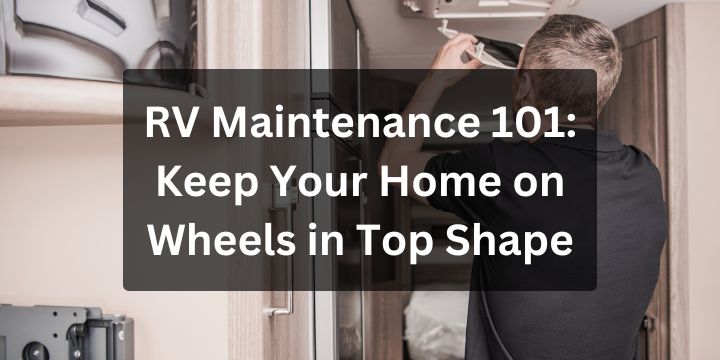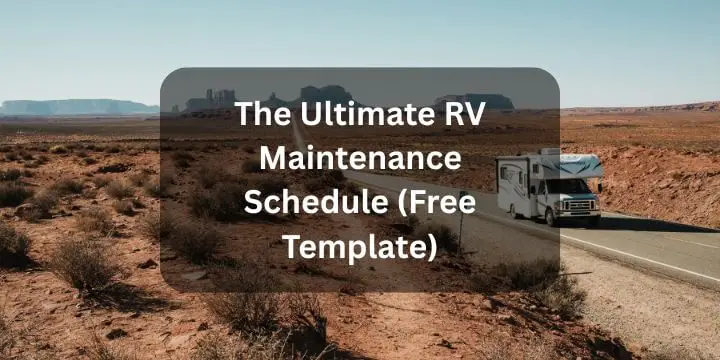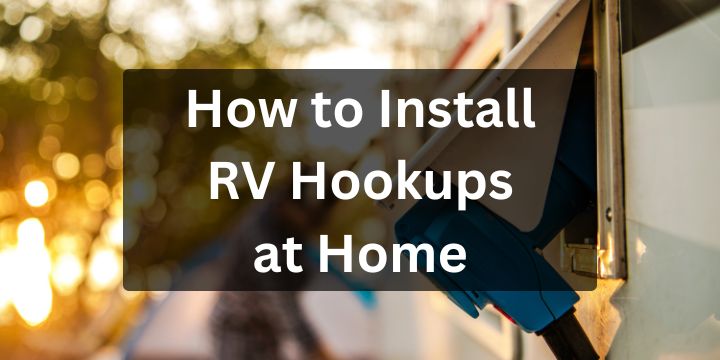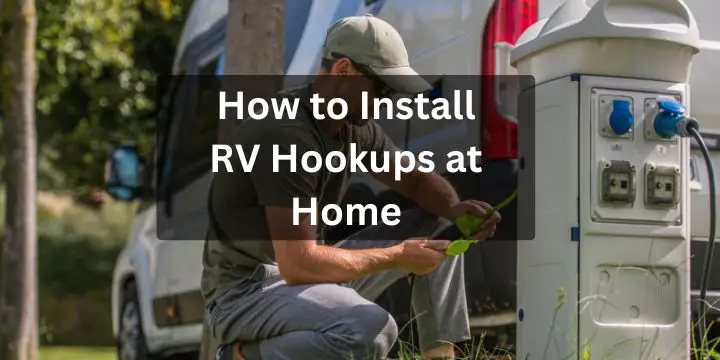
Owning an RV opens the door to freedom and adventure, but it also comes with the responsibility of keeping your home on wheels in top condition.
Proper maintenance ensures not only the longevity of your RV but also your safety and peace of mind on the road. Whether you’re a seasoned traveler or a first-time owner, this guide will walk you through the essentials of RV maintenance.
1. Regular Roof Inspections
The roof is one of the most vulnerable parts of your RV, exposed to sun, rain, and debris.
- Inspect Quarterly: Check for cracks, punctures, or any signs of wear. Even small leaks can lead to costly water damage.
- Clean and Seal: Use a gentle cleaner to remove debris and dirt. Apply a protective sealant annually to prevent cracks and UV damage.
- Check Roof Accessories: Inspect vents, skylights, and air conditioning units for proper sealing and functionality.
2. Tires: Your RV’s Foundation
Tires are crucial for a smooth and safe ride, and neglecting them can lead to accidents or breakdowns.
- Monitor Tire Pressure: Check the pressure before every trip. Over- or under-inflated tires can cause blowouts or uneven wear.
- Inspect for Damage: Look for cracks, bulges, or uneven wear. Replace tires every 5-7 years, even if they appear in good condition.
- Use Tire Covers: When parked for extended periods, protect tires from UV damage with covers.
3. Electrical System Checks
Your RV’s electrical system powers everything from lights to appliances, so regular checks are essential.
- Batteries: Test battery voltage and clean terminals to ensure a strong connection. Replace batteries every 3-5 years.
- Shore Power: Inspect your power cord for fraying or damage. Ensure a secure connection when plugging into shore power.
- Fuses and Breakers: Carry spare fuses and regularly test breakers to avoid unexpected outages.
Read More: 7 Unforgettable RV Trips in the USA (In 2 Weeks!)
4. Plumbing Maintenance
The convenience of onboard water systems is a major perk of RV living, but they require upkeep.
- Drain and Flush Tanks: Regularly empty and flush black and gray water tanks to prevent buildup and odors.
- Inspect for Leaks: Check hoses, faucets, and connections for drips or cracks. Use plumber’s tape for minor fixes.
- Winterize in Cold Weather: Drain all water lines and use RV antifreeze to prevent freezing and burst pipes.
5. HVAC Systems: Stay Comfortable
Your RV’s heating, ventilation, and air conditioning systems ensure comfort in all weather conditions.
- Clean Filters: Replace or clean air filters monthly to maintain airflow and efficiency.
- Inspect Ducts: Check for blockages or leaks in the ventilation system.
- Service Annually: Have a professional inspect and service your HVAC system yearly.
6. Appliance Care
From refrigerators to stoves, your RV appliances need regular attention to function properly.
- Refrigerator: Keep the vents clean and ensure it stays level to operate efficiently.
- Water Heater: Flush the tank annually to remove sediment and check the anode rod for wear.
- Propane Systems: Inspect hoses and connections for leaks. Use a soapy water solution to detect bubbles, indicating a leak.
7. Exterior Maintenance
A well-maintained exterior not only looks great but also protects your RV from the elements.
- Wash and Wax: Clean your RV regularly to remove dirt and grime. Apply wax every 6 months to protect the paint and finish.
- Inspect Seals and Caulking: Check windows, doors, and seams for gaps or cracks. Reseal as needed to prevent water intrusion.
- Check Lights: Test all exterior lights, including brake lights and turn signals, for functionality.
8. Engine and Chassis (For Motorized RVs)
If you own a motorhome, maintaining the engine and chassis is crucial for reliability.
- Oil Changes: Follow the manufacturer’s recommended schedule for oil and filter changes.
- Fluid Levels: Check and top off coolant, transmission, and brake fluids regularly.
- Inspect Belts and Hoses: Look for cracks or wear that could lead to failure.
- Brakes: Test brake pads and rotors for wear and replace as needed.
9. Safety Equipment
Safety should always be a top priority when traveling in an RV.
- Fire Extinguishers: Ensure they are easily accessible and check expiration dates.
- Smoke and Carbon Monoxide Detectors: Test monthly and replace batteries as needed.
- Emergency Kit: Carry a kit with first aid supplies, tools, flashlights, and extra fuses.
10. Keep it Organized
An organized RV makes maintenance easier and your travels more enjoyable.
- Storage Bins: Use labeled bins to keep tools, spare parts, and cleaning supplies tidy.
- Maintenance Log: Record all repairs and maintenance tasks for reference.
- Declutter Regularly: Remove unnecessary items to keep your RV lightweight and efficient.
Tips for Long-Term Storage
If you’re storing your RV for an extended period, take these steps to prevent deterioration:
- Clean Thoroughly: Remove all food, empty tanks, and clean the interior to avoid pests and odors.
- Disconnect Batteries: Prevent battery drain by disconnecting or using a trickle charger.
- Cover Your RV: Use an RV cover to protect it from the elements, especially UV rays and snow.
Final Thoughts
Maintaining your RV doesn’t have to be overwhelming. With a routine schedule and a little effort, you can keep your home on wheels in excellent condition for years to come. Remember, proactive care saves money and ensures you’re always ready for the next great adventure. So, grab your checklist and give your RV the love it deserves—your future self (and travels) will thank you!
Read More: Cruise America: RV Rental Tips for First-Timers
New to RV Living? Start the Right Way — From Day One.
Avoid costly beginner mistakes and start RV living with confidence using a simple, proven system.
Download the RV Beginner Starter PackInstant download · Beginner-friendly · Secure checkout


